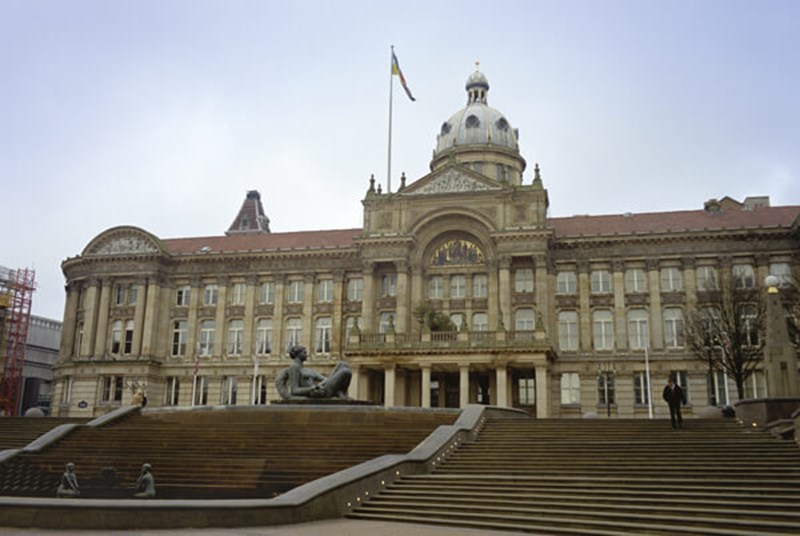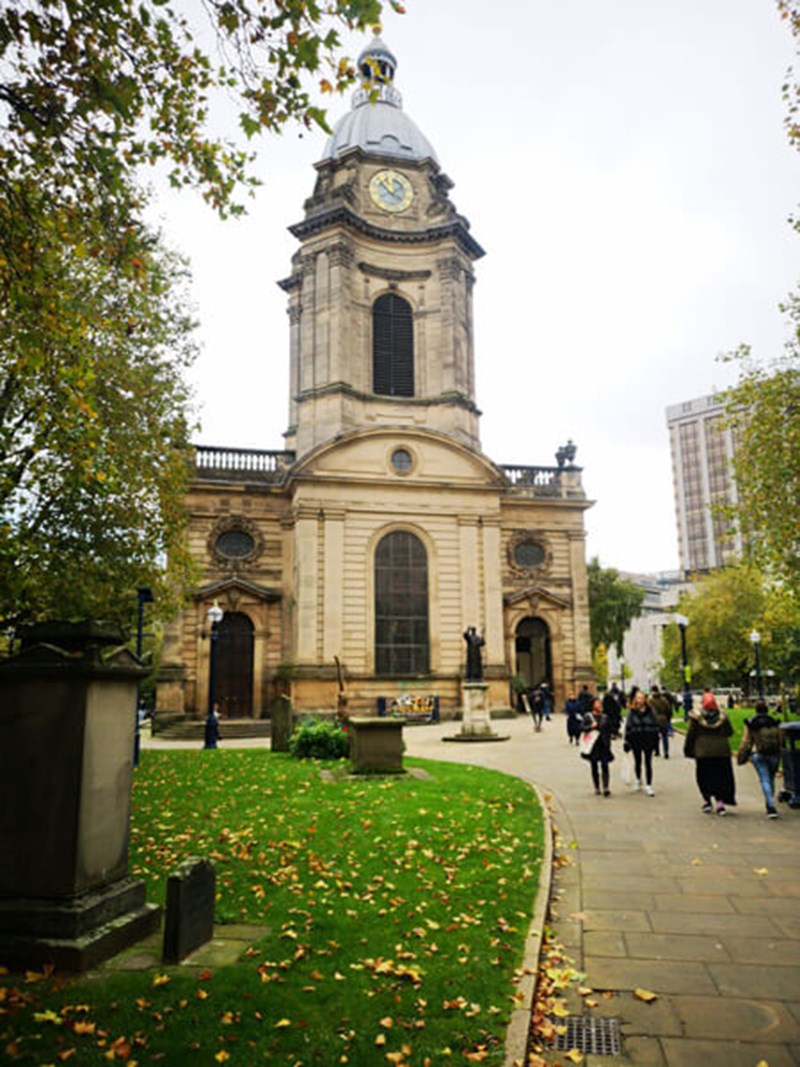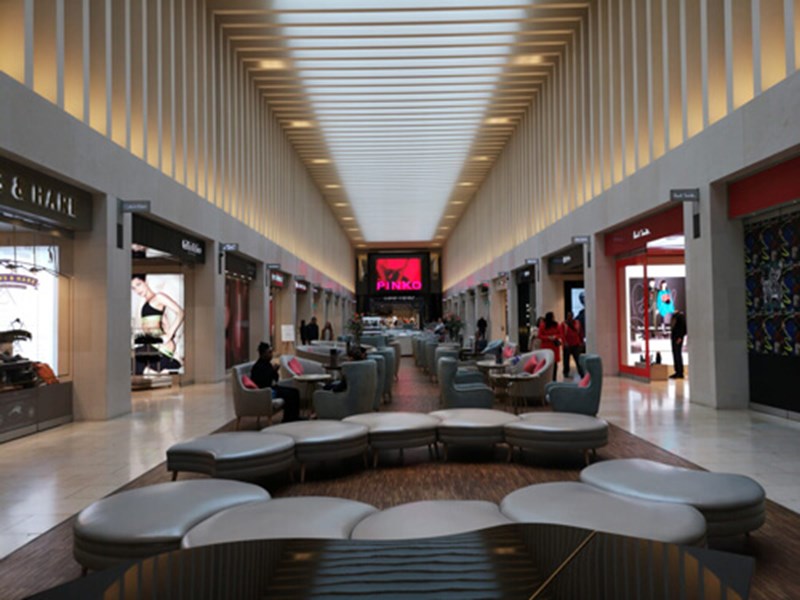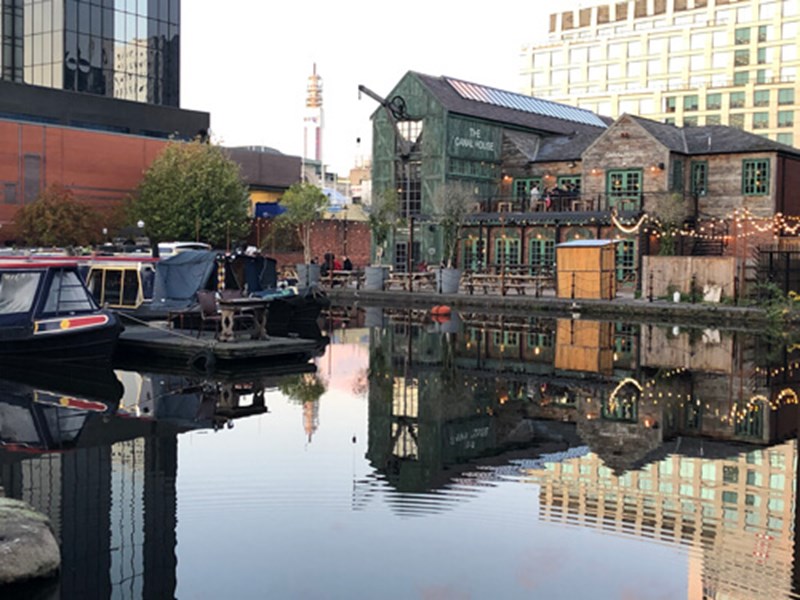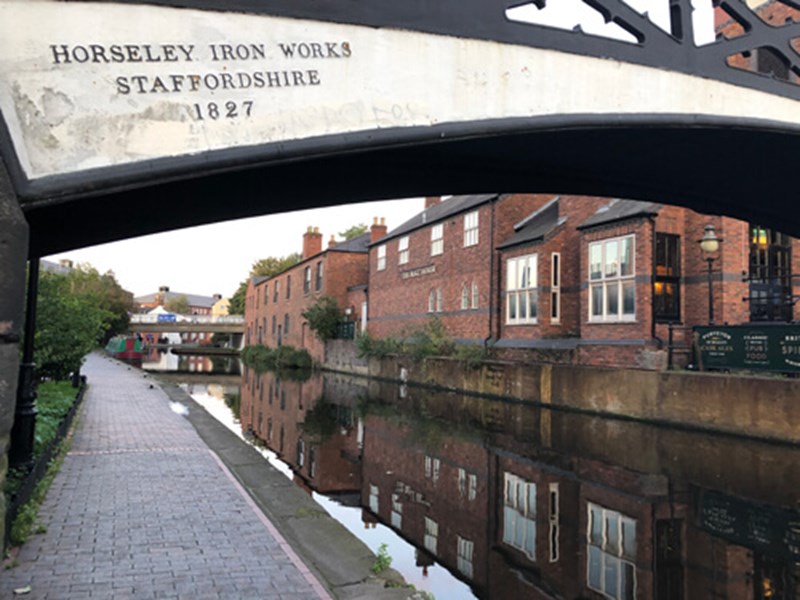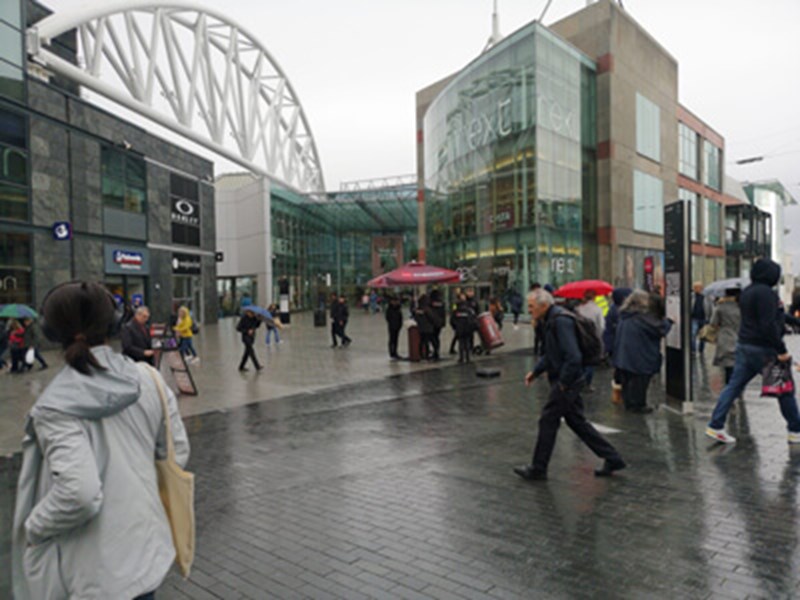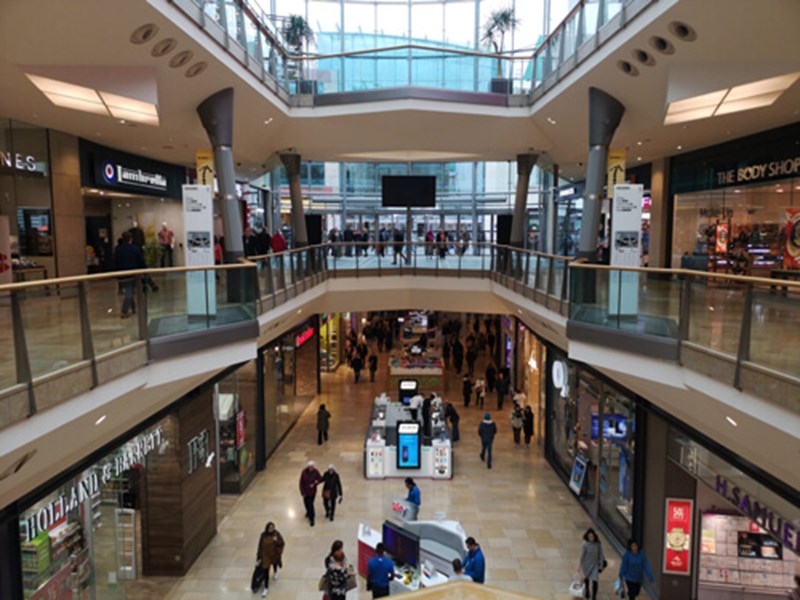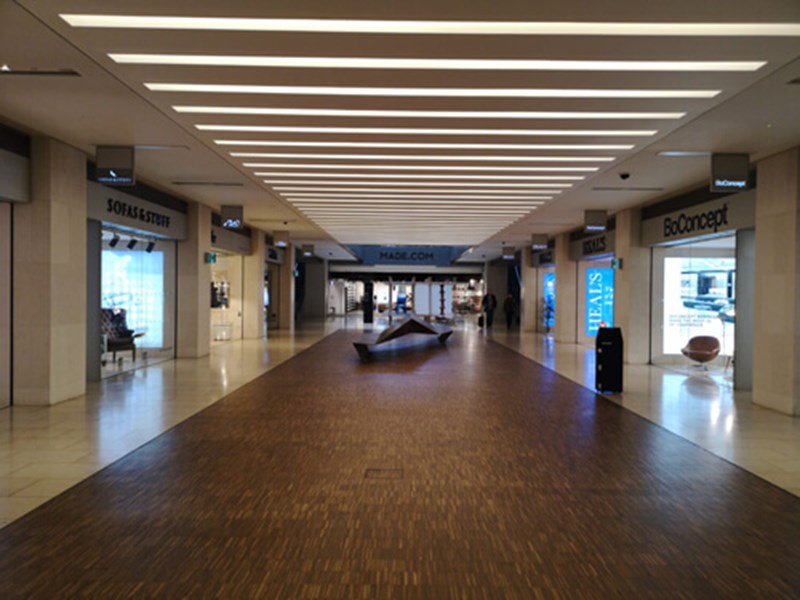When Richard Irving and Ann-Louise McDermott made their successful bid to host BACO 2020 in Birmingham, they knew it had far more going for it than the International Conference Centre! Lucy Dalton tells us a little more about the attractions of England’s second city and interviews the two local organisers.
Ever thought of England’s (geographical) waist as a skinny no-man’s-land? Well think again: England’s midriff is big. Not the ugly, liposuction-inspiring, blobby fat; rather, that enviable bulky, athletic big that comes with years of determination, guts and training. Why?
Birmingham. Birmingham, UK, is the heavyweight centre of Mid-England. As the UK’s second largest city (1.2 million inhabitants), and sistered with cities such as Chicago, Frankfurt, Milan, Johannesburg and Changchun, it contends in a league of its own. Though Spaghetti Junction, a convoluted local road network with a daily through-put of 160,000 cars, and the famously congested motorways surrounding Birmingham (statistically worst on Wednesdays!) make road access somewhat unappealing, choose rail or air travel instead, and you’ll find yourself smoothly transported into the city’s vibrant, cosmopolitan heart.
Who’d have thought that shopping was the original stimulus for Birmingham’s growth? Back in the Domesday Book era of 1086, the Manor of Birmingham was sparsely populated and poor. Valued at 20 shillings, it would hardly have featured on William the Conqueror’s tax-hunting radar. Scattered habitation and gentle waterways punctuated rolling hills. Enter Peter de Birmingham, new Lord of the Manor. In the mid-12th century he began holding markets at his castle, from whence developed a market town. Little did the farmers of the time realise that the ring in the ground used for tethering bulls on market days would turn into one of Birmingham’s most iconic (shopping) landmarks almost a millennium later: The Bullring.
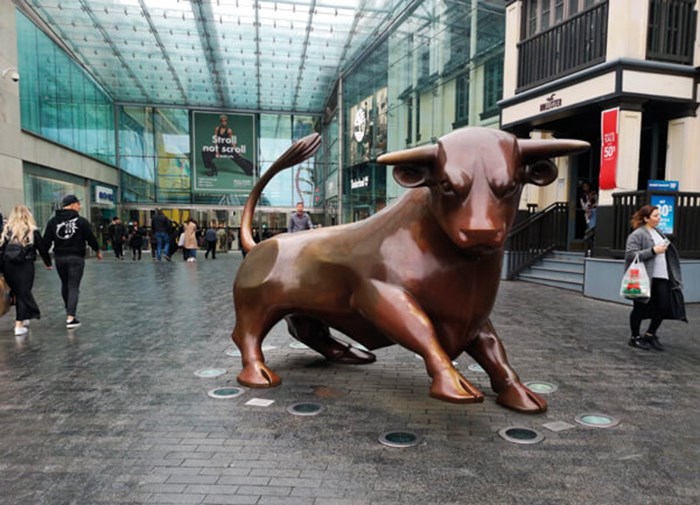
The Bull at The Bullring.
Shopping and trade remained central to Birmingham’s growth and development throughout the centuries, for example, during the 18th century Midlands Enlightenment. At this time, a close network of leading intellectuals and major manufacturers would meet on full moon evenings (to enable safer homeward journeys in the absence of street illumination) for food and discussion. This ‘Lunar Society’ was regularly attended by key thinkers such as Erasmus Darwin (physician and abolitionist), James Keir (scientist and industrialist), James Watt (inventor and engineer) and Josiah Wedgwood (potter and entrepreneur). It was the close collaboration of intellectuals and producers of the day that stimulated huge innovation, allowing Birmingham to boom during its industrial years; three times as many patents were produced here compared to anywhere else in Britain and Birmingham became a significant driver in the production of cast iron, the mechanised cotton industry, the development of the factory system and the industrial steam engine.
“Who’d have thought that shopping was the original stimulus for Birmingham’s growth?”
The Birmingham workforce boasted highly creative and adaptable craftspeople, skilled in a huge variety of specialist trades, working in small-scale workshops. By the start of the 20th century Birmingham had become a major financial centre internationally and was known as the ‘City of a Thousand Trades’.
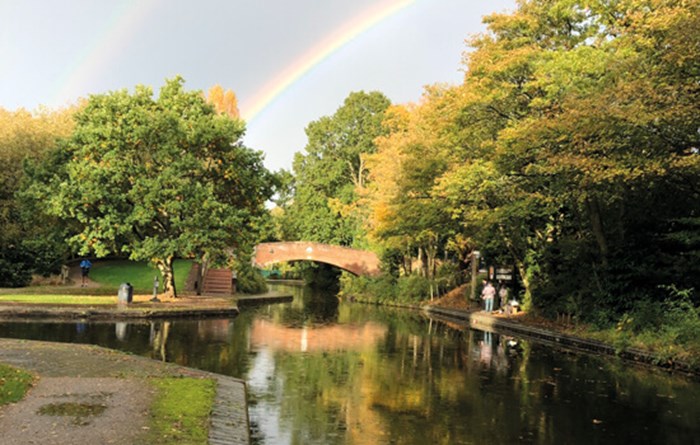
One of Birmingham’s many beautiful canals.
The somewhat tougher post-war decades that followed the Birmingham Blitz were characterised by a significant shift in the city’s demography, a dispersal of industry and population by central government, followed by a sharp economic decline. Nevertheless, the city’s resilience prevailed. Today Birmingham’s predominant economic driver is the service sector, though manufacturing still provides a significant level of employment. Three hundred independent jewellery producers of Birmingham’s Jewellery Quarter produce 40% of UK-made jewellery.
With recent house price increases of 5%, Birmingham has been declared the best place for property investment in the UK. With a temperate maritime climate, more parks than any other European city, six universities, the UK’s largest inner city shopping centre (The Bullring and Grand Central), and world-renowned cultural institutions such as the City of Birmingham Symphony Orchestra, the Birmingham Royal Ballet, the Birmingham Repertory Theatre, the Barber Institute of Fine Arts and the Library of Birmingham, it is perhaps easy to understand why Birmingham ranked 49th in the world on the Mercer Quality of Living Survey in 2019.
“Whether your agenda is meeting colleagues and networking, an academic update, or to hear the latest on professional matters, BACO has it all”
So you’ve never been to a concert at Symphony Hall? Shopped at The Bullring? Eaten at The Mailbox? Had coffee at Brindley Place? Seen Birmingham University’s Old Joe Clock Tower (upon which Tolkien based his Eye of Sauron) or walked through one of the famous Botanical Gardens? Then drop in 8-10 July 2020 and find out for yourself what this amazing city has to offer.
Interview with Richard Irving
Local Organising Chair BACO 2020
BACO 2020.
To some extent, I feel quite responsible for BACO 2020 being in Birmingham. I put forward the initial bid which was negotiated with ENT UK and the event venue over five years ago. Since then I have worked closely with Gerry O’Donoghue, BACO Master, I recommended Hisham Mehanna as the academic lead and have worked with ENT UK on the practicalities of the meeting and the social programme.
How long have you lived and worked in Birmingham?
I moved to Birmingham in 1997 following my Fellowship in San Francisco. I knew little of the place before 1997 and have enjoyed life here and worked in Birmingham ever since.
Do you have a favourite spot in Birmingham – what makes it special?
I have the luxury of being able to walk to all my places of work – a relaxing route to the Children’s Hospital takes me along some of Birmingham’s many canals. We all need our thinking time and I do mine while walking into work.
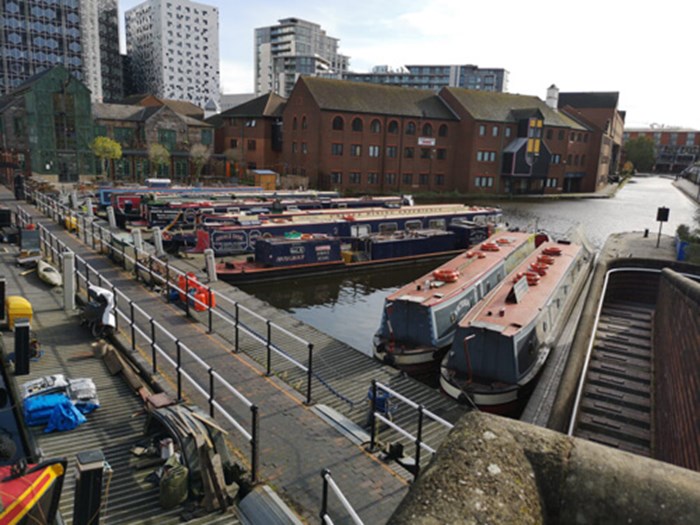
What makes Birmingham such a vibrant city?
Birmingham is often quoted as being the youngest city in Europe. Whether or not this is true I am uncertain, however, I feel much of the vibrancy of the city is down to the energy coming from the many young people making their home here and making the most of their lives in the city.
Please describe BACO 2020 in three words.
Unmissable. Incomparable. Inspirational.
If only able to attend one conference in 2020, why make it BACO?
BACO is the only conference that truly caters for all that you could possibly want from a meeting. Nothing else in the UK comes anywhere near to the variety and quality that BACO delivers. Whether your agenda is meeting colleagues and networking, an academic update, or to hear the latest on professional matters, BACO has it all.
For delegates wanting to go for a run during BACO 2020, where do you suggest?
I would suggest taking a route out of the city along one of the canals, starting from nearby the conference centre. This avoids all the major roads. Heading out towards Edgbaston and the University would be my preference.
What are you looking forward to at the BACO 2020 party?
The world of ENT relaxed, interacting and thoroughly enjoying themselves.
Do you have any recommendations of things to see or do in Birmingham and surrounding area for partners/family accompanying delegates to BACO 2020?
For lovers of art and literature I would recommend the collection at the Birmingham & Art Gallery or Shakespeare’s Stratford. For those interested in history, Warwick Castle and the Ironbridge Gorge Museum from where the origins of the industrial revolution can be traced. I have no knowledge of the Peaky Blinders tours but, for aficionados, they might be worth a look.
Interview with Ann-Louise McDermott
Local Organising Vice Chair BACO 2020
Please tell us about your role at BACO 2020.
I have been involved as part of the local organising committee dealing with more of the hospitality and social side of the BACO arrangements.
How long have you lived and worked in Birmingham?
I have worked in Birmingham since 1991 with short periods of work overseas.
Please describe Birmingham in three words.
Vibrant, busy and diverse.
What does Birmingham hold for food lovers?
Birmingham is best known for its amazingly diverse restaurants. There are at least five Michelin Starred restaurants. The city centre and Brindley Place offer an eclectic mix of restaurants and bars with something for everyone. Best of all, it’s all easily accessible on foot from any city centre hotel.
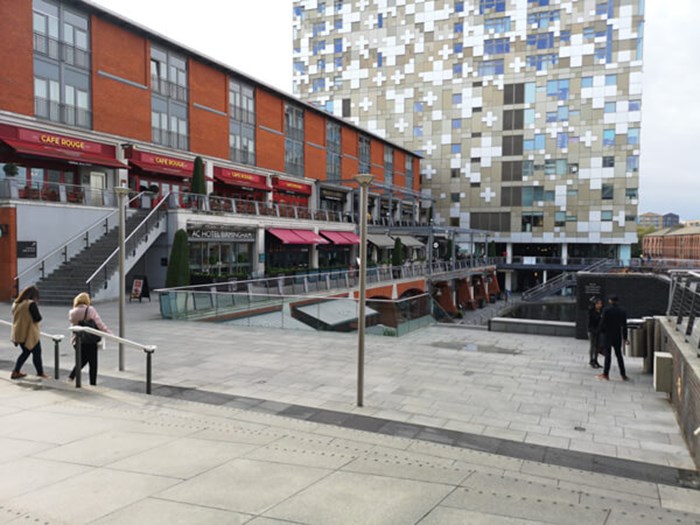
My favourite restaurant is The Ivy in Colmore Row. This can be expensive, but it has a great atmosphere and excellent food. For big meat eaters there is Fazenda and Gaucho in Colmore Row.
Do you have a favourite shop in Birmingham, and why?
I have to declare my guilty pleasure is the shoe section of House of Fraser. It has the best shoe collection under one roof in the city centre (at affordable prices).
Can you recommend a place to go for a nice walk in Birmingham?
Birmingham has a huge canal network which is a fascinating place to walk and is easily accessible if staying in the city centre. For those with transport I would suggest a walk around the National Trust Packwood house and gardens. More local suggestions are Cannon Hill Park and Clent Hills.
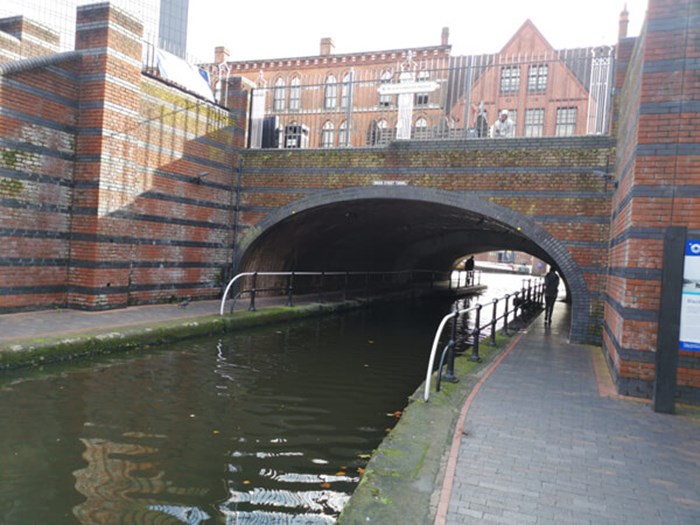
What makes Birmingham a great venue for BACO 2020?
Birmingham has great conference facilities in the city centre and Birmingham has something for everyone at affordable prices.
Do you have any recommendations of things to see or do in Birmingham and surrounding area for partners/family accompanying delegates to BACO 2020?
I would definitely recommend a day trip to Cadbuy’s World and the Black Country Museum, especially if accompanying family. Warwick Castle and a day trip to Stratford upon Avon are also fabulous options.


